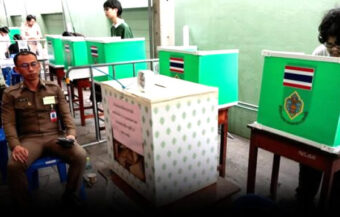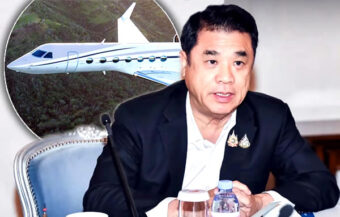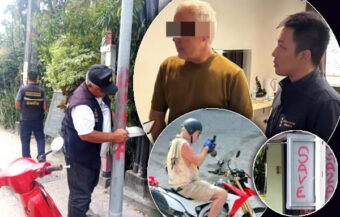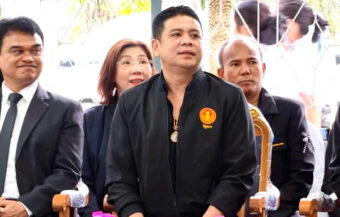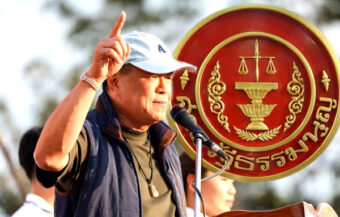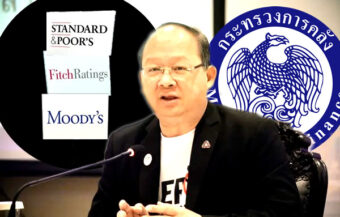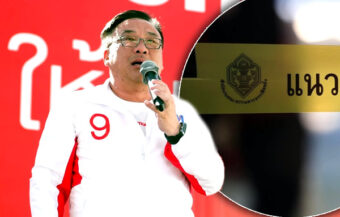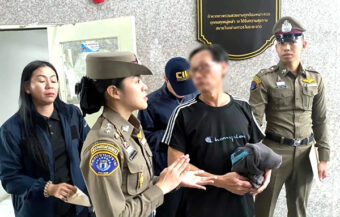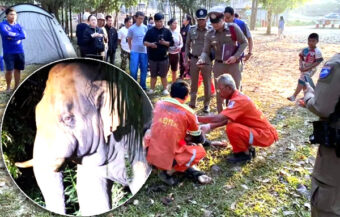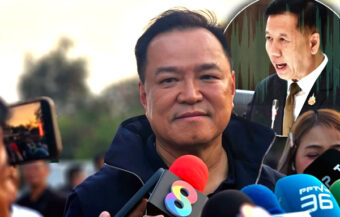Anutin is aggressively consolidating power as Thailand’s Prime Minister courts MPs and military allies, expands Bhumjaithai, defies critics while building a Buriram network that now dominates national politics, while the opposition watches and waits anxiously.
Concerns are mounting fast within the People’s Party that the man they backed as Thailand’s 32nd Prime Minister is already breaking ranks. Anutin Charnvirakul appears to be sidestepping the very MOU that paved his way to power. Instead, he’s aggressively expanding Bhumjaithai’s reach, openly courting political networks across the country and working to boost his coalition’s headcount beyond the current 146 MPs. On Sunday, he dismissed Pheu Thai’s attack on his cabinet as the “Buriram Power Network,” brushing it off while doubling down on the value of political connections. At the same time, he was busy tightening ties with the military elite, showing up at a high-profile celebration for the 61st class of the National Defence College, of which he is a proud member. Anutin isn’t just consolidating power—he’s making it clear he plans to keep it.
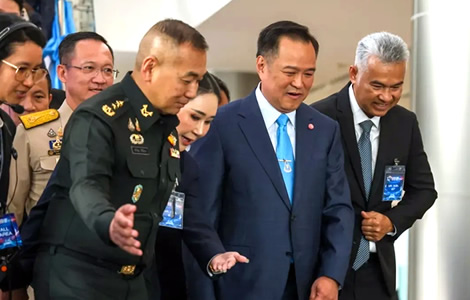
Prime Minister Anutin Charnvirakul is not just filling a caretaker role — he’s building a lasting political machine. In recent days, up to 12 MPs from the faltering United Thai Nation Party (Ruam Thai Sang Chart) have begun shifting loyalties. They were once staunch members of the party aligned with former Prime Minister Prayut Chan-o-cha. Now, however, they are preparing to join Anutin’s Bhumjaithai Party — a move that could redraw Thailand’s conservative map.
Over the weekend, Anutin met with Ratchaburi MP Akaradej Wongpitakroj, a key figure in the emerging political reshuffle. This meeting followed the sudden resignation of Akanat Promphan, former Industry Minister and Secretary-General of Ruam Thai Sang Chart.
Akanat crackdown legacy and shifting alliances fuel Bhumjaithai momentum ahead of parliament dissolution
While he has not confirmed his next move, Akanat is widely expected to follow his allies to Bhumjaithai. Notably, he earned national recognition for cracking down on “zero-dollar” Chinese factories and other illicit foreign investments. His campaigns struck a chord with voters — and stirred concern among powerful interests.
Meanwhile, Akaradej has already spoken publicly about his contact with Anutin. He confirmed a meeting took place on Sunday and hinted at upcoming realignments. Although he remains a member of Ruam Thai Sang Chart for now, his language signals an imminent departure.
“Everyone’s waiting for Akanat,” he said. “Once he moves, we move.” The defectors are expected to follow before the next dissolution of Parliament.
As this unfolds, suspicion is growing inside the People’s Party. Many believe Anutin’s moves suggest he has no intention of stepping down soon. Though his current term is defined as transitional, his actions point to deeper ambitions. He is not just filling space — he is filling a power vacuum.
Military ties and Buriram roots shape Anutin’s growing authority inside national security establishment
On Sunday, Anutin made a high-profile appearance at a National Defence College event for the 61st graduating class. He is a member of this elite group, known for shaping military and political leaders.
At the event, he stood side by side with top generals and civil servants. Just days before, he appointed one of his classmates — Lt. Gen. Adul Bunthamcharoen — as Deputy Minister of Defence. Importantly, Adul is also a Buriram native, reinforcing the growing influence of Anutin’s provincial base.
Critics have seized on these appointments. The Pheu Thai Party now refers to Anutin’s inner circle as the “Buriram Power Network.” Yet rather than deny the label, Anutin appears to embrace it. He sees strength in regional unity and loyalty. According to him, his network from the National Defence College is “an asset to the nation — when used ethically.”
Opposition prepares to attack in parliament while Anutin counters with defiance and political messaging
Nevertheless, the opposition is preparing to strike. Deputy Pheu Thai spokesman Chanin Rungthanakiat laid out the party’s strategy for the next parliamentary session. First, they plan to challenge the integrity and qualifications of Anutin’s cabinet ministers.
Some, Chanin noted, face allegations of land encroachment or links to past corruption. Others were implicated in the Senate collusion scandal linked to the controversial 2024 election now under active investigation. “If the judicial process is allowed to function,” he warned, “it may end careers.”
Second, Pheu Thai will press the government on its promised constitutional reforms. A four-month transition was agreed in a memorandum between the People’s Party and Bhumjaithai. However, many now suspect that timeline may quietly be extended. For critics, this so-called “short-term” government is starting to look more permanent.
Despite these growing attacks, Anutin has responded with calm defiance. When asked about the accusations, he said, “They can debate. I have facts to respond.” He also took aim at his critics’ own hypocrisy. “What about their past networks?” he asked. “Maybe they should look at themselves first.”
Anutin introduces the STECS model and economic plan while asserting authority over border issues
Crucially, Anutin continues to push ahead with public-facing policy. At a second NDC event later that day, he presented his new development model: STECS — Systematic, Thainess, Exponential, Connection, Continuity, and Constructive.
These principles, he said, will guide both national security policy and economic planning. In his words, “We must be proactive, not reactive. We must set the terms, not surrender.”
He also addressed rising tensions with Cambodia. Skirmishes along the border have led to growing public anxiety. According to Anutin, the issue must be resolved within four months — without further bloodshed. This hard deadline reflects a key shift. Anutin is acting like a leader in charge, not one temporarily holding power.
Economically, the government is ready to launch the “Half-Half Plus” program — a 60:40 tax-sharing stimulus designed to revive domestic consumption. The policy mirrors Bhumjaithai’s earlier populist playbook and aims to deliver quick results before any national election. “Everything is already in the pipeline,” Anutin said. “We will accelerate it.”
Critics voice concern over political optics while the coalition strengthens and the Buriram bloc rises
Still, critics worry that this economic push may be more about optics than real outcomes. Some believe the program — like the government itself — may be a tool to buy time while legal threats loom.
Back in Parliament, whispers continue to grow. The reshuffling of conservative forces has sparked panic among rival camps. As one senior aide to Anutin hinted, “The coalition is united. There is no conflict. This is a big win for the country.”
Indeed, the core of that coalition now appears to be centred in Buriram. It is there, not in Bangkok, that decisions are being made. It is also where Anutin draws his deepest loyalty — and his strongest political muscle.
Akaradej shadows Anutin as defections loom and the Buriram bloc solidifies power nationally
On Sunday, Akaradej was seen walking closely behind Anutin at the NDC event. It was a symbolic moment — a former Prayut ally shadowing Thailand’s new power broker.
Asked later whether he would officially join Bhumjaithai, Akaradej smiled. “People tease me that the only thing left is to sign the form,” he said. By all appearances, that signing is a matter of when, not if.
Political trust between the parties at an all-time low as the country finds itself in deepening and confusing crisis
Anutin’s revenge as he comes back to power as Prime Minister elect after resigning from cabinet in June
Husband of Thaksin’s daughter Pintongta tipped as Pheu Thai Prime Ministerial nominee in political reset
As Parliament moves toward debate and eventual dissolution, the stakes are rising. The Anutin government has promised reform, unity, and progress. But critics are watching closely — and waiting to pounce.
One thing is certain: the Buriram bloc is no longer just a regional alliance. It is now the nucleus of national power. Whether the country’s pro-democratic parties like it or not, Anutin Charnvirakul is no longer just a caretaker. He’s the man setting the terms.
Join the Thai News forum, follow Thai Examiner on Facebook here
Receive all our stories as they come out on Telegram here
Follow Thai Examiner here
Further reading:
New cabinet to be sworn in at Dusit Palace in Bangkok on Wednesday September 24th before the King
Anutin planning eight-month economic programme as his PM tenure will extend to the next government
2nd Army chief warns Acting PM Cambodian regime cannot be trusted and that border must stay closed



